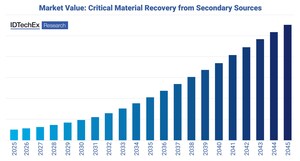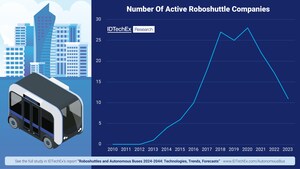BOSTON, April 9, 2024 /PRNewswire/ -- After years of hype, the 3D printing industry has moved onto a more critical examination of the value-add that effective additive manufacturing adoption brings to businesses and supply chains. In a recent episode on 3D printing, the technology innovation podcast 'Tomorrow's Tech by IDTechEx' explored the history and benefits of this versatile technology, which has existed for over 30 years yet is still finding new applications and end-users in many major sectors.
Commercial uses
Exciting prospects for 3D printing are making the news, as large companies such as Apple are reportedly using it to make metal frames for smart watches, employing specifically a process called binder jetting. IDTechEx Senior Technology Analyst Sona Dadhania states that although it is unclear to what extent Apple has been using binder jetting, it has made a huge wave in the 3D printing industry.
Powder bed technology has been adopted for more commercial cases, used to make custom footwear for athletes. Using an energy source like a laser, particles can selectively be melted on a powder bed to create the desired shape and built up to create the desired structure. Specific measurements of the foot are used to make the lattice structure of custom shoes and allow the soles to conform to the foot for comfort while exercising.
Industry and repairs
The automotive and general manufacturing industries also benefit from this powder-bed method, with speed and efficiency at the heart of its process. Replacement parts for vehicles and machines can be produced with precision and done anywhere worldwide. While part manufacturing used to be confined to major manufacturing countries, such as China, 3D printing is not confined by geography and, in this way, can be more cost-effective and more reliant. In their research on 3D printing, IDTechEx predicts the 3D printing market to surpass US$44bn by 2034.
On-demand repairs in far-out environments or remote locations could be another strength for 3D printing. As 3D printing can produce spare parts quickly, rather than having to wait for parts to be sent out, the right equipment could be produced on-site. This will be particularly useful in energy industries, such as oil and gas, and renewable energy.
Filling a gap in the market
Prototyping was the original use for 3D printing and is still very much a use for it today in many major sectors. Not only is the turnaround time faster than other prototyping technologies, but this technology can also create geometries that have been unachievable by other means of prototyping. It maximizes shape and size while producing less wasted materials. The technology is ideal for cost-effectively producing a few thousand prototypes or less, filling a gap in the market with its accelerated design. Despite these strengths, 3D printing can be slower than injection moulding, so more innovation would be needed to make it suitable for mass scale production in the future.
Much of the hype around 3D printing isn't too accurate, with headlines excitedly proclaiming that food or whole phones will be 3D printed in the future, but the industry is far more realistic now with its challenges to overcome in high-value sectors. The continued penetration into automotive cases could be profitable, alongside potential medical uses such as customizations of medical devices and tools and models. However, the reality of application is more difficult due to the qualifications and standards that must be met.
In the podcast, IDTechEx analyst Sona Dadhania, lead author of IDTechEx's additive manufacturing research, predicts that over the next 5-10 years, the entire 3D printing ecosystem will evolve to make 3D printing implementations as smooth as possible in various sectors. The possibilities are diverse and are making exciting developments, with the next step being to understand the user needs in high-value industries and working to achieve this.
For more information on this topic, please refer to IDTechEx's latest report, '3D Printing and Additive Manufacturing 2024-2034: Technology and Market Outlook', or view the full portfolio of 3D printing research available at www.IDTechEx.com/Research/3D. New episodes of 'Tomorrow's Tech by IDTechEx' are released monthly, with host Dr Tess Skyrme interviewing an array of industry experts from IDTechEx, offering listeners accessible insights into a range of technology innovations. See more at www.IDTechEx.com/Podcast.
About IDTechEx
IDTechEx provides trusted independent research on emerging technologies and their markets. Since 1999, we have been helping our clients to understand new technologies, their supply chains, market requirements, opportunities and forecasts. For more information, contact research@IDTechEx.com or visit www.IDTechEx.com.
Media Contact:
Lucy Rogers
Sales and Marketing Administrator
press@IDTechEx.com
+44(0)1223 812300
Social Media Links:
Twitter: www.twitter.com/IDTechEx
LinkedIn: www.linkedin.com/company/IDTechEx
Logo: https://mma.prnewswire.com/media/478371/IDTechEx_Logo.jpg






Share this article